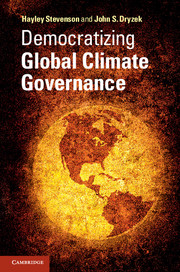Book contents
- Frontmatter
- Contents
- List of Tables
- Preface
- Acknowledgments
- List of Acronyms
- 1 The challenge of global climate governance
- 2 Global climate governance as a deliberative system
- 3 Governance with and without institutionalized authority
- 4 Authoritative global governance
- 5 Emerging centers of networked authority
- 6 Transmitting public concerns in the deliberative system
- 7 Accountability
- 8 Improving the global deliberative system
- 9 Conclusion
- References
- Index
4 - Authoritative global governance
The United Nations Framework Convention on Climate Change
Published online by Cambridge University Press: 05 June 2014
- Frontmatter
- Contents
- List of Tables
- Preface
- Acknowledgments
- List of Acronyms
- 1 The challenge of global climate governance
- 2 Global climate governance as a deliberative system
- 3 Governance with and without institutionalized authority
- 4 Authoritative global governance
- 5 Emerging centers of networked authority
- 6 Transmitting public concerns in the deliberative system
- 7 Accountability
- 8 Improving the global deliberative system
- 9 Conclusion
- References
- Index
Summary
Introduction
The discourses we enumerated in the previous chapter are key ingredients for any deliberative system for the global governance of climate change, but there is more to the story than their interaction. Any deliberative system requires places where public authority gets exercised – “empowered spaces,” in the scheme we set out in Chapter 2. In this chapter we analyze the deliberative capacity of one kind of empowered space, the global negotiations organized under the auspices of the United Nations Framework Convention on Climate Change (UNFCCC). We should, however, bear in mind that, in keeping with the systemic approach, non-deliberative practices can have deliberative consequences for the system as a whole, and we will be alive to this possibility in our analysis of the UNFCCC negotiations.
Guided by the search heuristics specified at the end of Chapter 2, in empowered space (as for any part of the deliberative system) we should begin by looking for evidence of deliberative authenticity. Then we should seek in particular the more consensual moments of deliberative systems (the contestatory aspects being more appropriate in public space and transmission between public and empowered space), corresponding integration of diverse perspective on complex issues, and positive-sum discourses. We should also be alive to any potential for the reflexive capacity of meta-deliberation (though that can also be sought beyond empowered space). We can see how inclusion fares – though as we stressed in Chapter 2, inclusion is primarily a quality to be sought in public space rather than empowered space.
- Type
- Chapter
- Information
- Democratizing Global Climate Governance , pp. 61 - 85Publisher: Cambridge University PressPrint publication year: 2014



